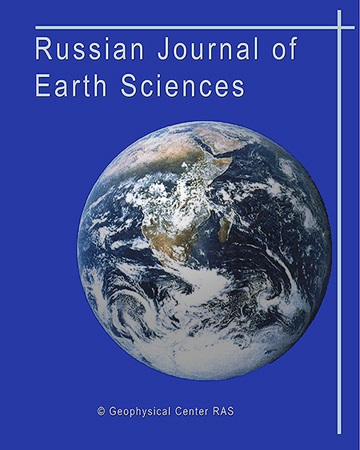The object of this study was gneissose gabbro from the plutonic rocks composing the opposite sides of the rift valley of the MAR segment located directly north of the 15o 20 fracture zone. The results of our K-Ar dating suggested the potential age asymmetry of the similar rocks composing the opposite side of the MAR rift valley between the 15o and 16o of the north latitude. The age value obtained for the gabbro sample collected from the western side of the rift valley seems to reflect the time of the magmatic interaction of this gabbro with the injections of tronghjemite melt and apparently corresponds to the crystallization stase of tronghjemite vein complex. On the other hand the age defined for the gabbro sample collected from the eastern side of the rift valley probably marking the time of its crystallization in the magma system, or the time of its high-temperature crystallization during the metamorphism. The proved age asymmetry of the opposite sides of the rift valley is believed to have been unassociated with any differences in the metamorphic evolution of the gabbro, its samples showing the same degree of metamorphism. The results of this study and the synthesis of all data available for the isotopic dating of the various MAR plutonic rocks suggest the presence of two types of igneous rock complexes in the crest zone of the ridge, which do not correspond to the modern igneous activity of the rift valley: 1the rocks localized in the segments with the Hess-type crust, associated with very low spreading rates and with the repeated melting under the mantle-like conditions of the lenses and interlayers of cumulative rocks often of abnormal geochemistry; 2The rocks represented by the lithospheric relicts of the Gondwana supercontinent lithosphere, characterized by the isotopic ages of hundreds of million years.
isotope dating, magmatic, metamorphic events, Mid-Atlantic Ridge, gneissose gabbro, plutonic rocks.
1. Aumento, Canad. J. Earth Sci., v. 6, 1969.
2. Bazylev, Petrology, v. 8, no. 3, 2000.
3. Brunelli, Cambridge Publications, Journal of Conference Abstracts, Europian Union of Geosciences, Strasbourg, v. 4, no. 1, 1999.
4. Cannat, Earth and Planetary Science Letters, v. 109, 1992.
5. Cannat, Mantle and lower crust exposed in oceanic ridges and in ophiolites, Vissers R. L. M. amp; Nicolas A. Eds., 1995.
6. Clague, Geol. Soc. Am. Bull, v. 86, 1975.
7. Dalrimple, Science, v. 161, 1968.
8. Dalrimple, Earth Planet. Sci. Lett., v. 31, 1976.
9. Dalrimple, Deep Sea Dril. Proj., Initial Rep., v. 55, 1980.
10. Dosso, Earth Planet. Sci. Letters, v. 170, 1999.
11. Dymond, Geol. Soc. Am. Bull., v. 81, 1970.
12. Faure, Principles of Isotope Geology, 1986.
13. Funkhouser, Earth Planet. Sci. Lett., v. 5, 1968.
14. Honnorez, J. Geophys. Res., v. 89, 1984.
15. Noble, Science, v. 162, 1968.
16. Ozima, Tectonophysics, v. 31, 1976.
17. Pilot, Nature, v. 393, 1998.
18. Reynolds, Initial Report of the Deep Sea Drilling Project, v. 37, 1977.
19. Seidemann, Geol. Soc. Am. Bull., v. 88, 1977.
20. Seidemann, Geochim. Cosmochim. Acta, v. 42, 1978.
21. Silantyev, Petrology, v. 6, 1998.
22. Silantyev, InterRidge News, v. 4, no. 2, 1995.
23. Silantyev, Annales Geophysicae, Part 1, Supplement 1 to Volume 16, European Geophysical Society, Society Symposia, Solid Earth Geophysics amp; Geodesy, 1998.
24. Stuart, Chemical Geology, v. 147, 1998.
25. Walker, Geochim. Cosmochim. Acta, v. 46, 1982.
26. Winther, Chemic. Geol., v. 127, 1996.
27. Xia, Eos Trans., Amer. Geophys. Union, v. 73, no. 43, 1992.














